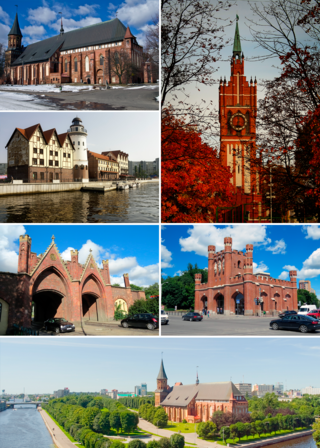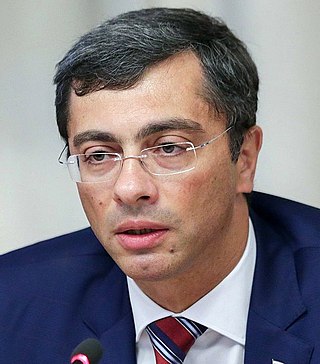You can help expand this article with text translated from the corresponding article in German. Click [show] for important translation instructions.
|
Vladimir Slivyak is a Russian environmental activist.
You can help expand this article with text translated from the corresponding article in German. Click [show] for important translation instructions.
|
Vladimir Slivyak is a Russian environmental activist.
Vladimir Slivyak was born in Kaliningrad in 1973. [1]
In 1989, Slivjak was one of the co-founders of the environmental organization Ecodefense! in Kaliningrad. In 1994, he achieved the decommissioning of a nuclear power plant in Lithuania. He was the first to draw attention to the dangers of transporting depleted uranium from Germany to Russia. [1]
From 2011 to 2015, he taught environmental policy at the Moscow School of Economics. [1]
In 2014, Ecodefense! was the first environmental organization to be classified as a foreign agent in Russia. Slivjak sued and defended himself against the associated restrictions, as did other members of the organization. He emigrated to Germany after the case proved unsuccessful. [1]
In 2016, he published the book From Hiroshima to Fukushima. In 2019, he and others made a documentary about the destruction of the landscape and threats to health in the Kuzbass coal region. [1]
In 2021, Vladimir Slivyak received the Right Livelihood Award. [2] [1]
In 2022, Schönau Electricity Works was chosen as Stromrebel 2022. [3]

Kaliningrad Oblast is the westernmost federal subject of the Russian Federation, in Central and Eastern Europe. It is a semi-exclave situated on the Baltic Sea. The oblast is surrounded by two European Union and NATO members: Poland to the south and Lithuania to the north and east. The largest city and administrative centre of the province (oblast) is the city of Kaliningrad, formerly known as Königsberg. The port city of Baltiysk is Russia's only port on the Baltic Sea that remains ice-free in winter. Kaliningrad Oblast had a population of roughly 1 million in the Russian Census of 2021.

The Right Livelihood Award is an international award to "honour and support those offering practical and exemplary answers to the most urgent challenges facing us today." The prize was established in 1980 by German-Swedish philanthropist Jakob von Uexkull, and is presented annually in early December. An international jury, invited by the five regular Right Livelihood Award board members, decides the awards in such fields as environmental protection, human rights, sustainable development, health, education, and peace. The prize money is shared among the winners, usually numbering four, and is €200,000. Very often one of the four laureates receives an honorary award, which means that the other three share the prize money.

Deutsche Welle, commonly shortened to DW, is a German public, state-owned international broadcaster funded by the German federal tax budget. The service is available in 32 languages. DW's satellite television service consists of channels in English, German, Spanish, Persian, and Arabic. The work of DW is regulated by the Deutsche Welle Act, stating that content is intended to be independent of government influence. DW is a member of the European Broadcasting Union (EBU).

LDPR — Liberal Democratic Party of Russia is a Russian ultranationalist and right-wing populist political party in Russia. It succeeded the Liberal Democratic Party of the Soviet Union (LDPSU) in Russia after the dissolution of the Soviet Union. The party was led by Vladimir Zhirinovsky since its inception until his death in April 2022. Opposing both communism and capitalism of the 1990s, the party scored a major success in the 1993 Duma elections with almost 23% of the vote, giving it 64 seats of the 450 seats in the State Duma. In the 2021 elections, the party received 7.55% of the vote, giving it 21 seats.
Memorial is an international human rights organisation, founded in Russia during the fall of the Soviet Union to study and examine the human rights violations and other crimes committed under Joseph Stalin's reign. Subsequently, it expanded the scope of its research to cover the entire Soviet period.

Vladimir Olegovich Potanin is a Russian billionaire businessman. He acquired his wealth notably through the controversial loans-for-shares program in Russia in the early to mid-1990s.

José Antônio Kroeff Lutzenberger was a Brazilian agronomist and environmentalist. In 1988, he was awarded the Right Livelihood Award for his "contribution to protecting the natural environment in Brazil and worldwide".

Lyudmila Aleksandrovna Ocheretnaya is a Russian linguist who served as the First Lady of Russia from 2000 to 2008 and from 2012 to 2014 while married to her then-husband Vladimir Putin, the current president and former prime minister of Russia.

The Baltic Fleet is the fleet of the Russian Navy in the Baltic Sea.

Russia–European Union relations are the international relations between the European Union (EU) and Russia. Russia borders five EU member states: Estonia, Finland, Latvia, Lithuania and Poland; the Russian exclave of Kaliningrad is surrounded by EU members. Until the radical breakdown of relations following the 2022 Russian invasion of Ukraine, the EU was Russia's largest trading partner and Russia had a significant role in the European energy sector. Due to that full-scale invasion, relations became very tense after the European Union imposed sanctions against Russia. Russia placed all member states of the European Union on a list of "unfriendly countries", along with Taiwan, South Korea, Japan, Singapore, the United States, NATO members, Canada, Australia, New Zealand, Norway, Switzerland, Micronesia and Ukraine.
The Swedish Baltic Sea Water Award was a regional award by the Swedish Ministry for Foreign Affairs now discontinued. It had been administrated by Stockholm International Water Institute (SIWI) till 2010 and later handed over to the Swedish Institute (SI). Established in 1999 by the Swedish Ministry for Foreign Affairs, the award recognised direct and practical efforts by individuals, corporations, non-governmental organisations and municipalities to help improve the water environment of the Baltic Sea. Currently Swedish Institute operates "Cooperation in the Baltic Sea region" by providing Swedish organisations with funding, useful advice and help in finding partners in collaborating countries.

Poland–Russia relations have a long and often turbulent history, dating to the late Middle Ages. Over centuries, there have been several Polish–Russian Wars, with Poland once occupying Moscow and later Russia controlling much of Poland in the 19th as well as in the 20th century, leading to strained relations and multiple Polish attempts at re-acquiring independence. Polish–Russian relations entered a new phase following the fall of communism, with relations warming under Soviet Premier Mikhail Gorbachev and later Russian President Boris Yeltsin. Relations began worsening considerably as a result of the 2008 Russian invasion of Georgia, and later the 2014 annexation of Crimea and especially the 2022 Russian invasion of Ukraine. Relations between the Polish and Russian governments have become extremely unfriendly, and according to a 2022 poll, only 2% of Poles view Russia positively, the lowest number in the world among countries polled.
The anti-nuclear movement in Russia is a social movement against nuclear technologies, largely stemming from the results of the Chernobyl incident in 1986. During the most active phase of the anti-nuclear movement, from 1988 to 1992, construction of over 100 nuclear projects were prevented on the territory of the Soviet Union. Also, the economic troubles of the 1990s led to a reduction in the number of construction projects. This deprived the anti-nuclear movement of its raison d’être. At the same time, it too was affected by financial difficulties, in particular the lack of donations, which continues to be an issue today. Since the 2000s the Russian Government embarked on highly pro-nuclear policy, with plans to invest billions of dollars in developing the nuclear industry, which leaves the movement with big challenges.

Kaliningrad, until 1946 known as Königsberg, is the largest city and administrative centre of Kaliningrad Oblast, a Russian exclave between Lithuania and Poland. The city sits about 663 kilometres (412 mi) west of the bulk of Russia. The city is situated on the Pregolya River, at the head of the Vistula Lagoon on the Baltic Sea, and is the only ice-free Russian port on the Baltic Sea. Its population in 2020 was 489,359, with up to 800,000 residents in the urban agglomeration. Kaliningrad is the second-largest city in the Northwestern Federal District, after Saint Petersburg, the third-largest city in the Baltic region, and the seventh-largest city on the Baltic Sea.

The Normandy Format, also known as the Normandy contact group, is a grouping of states who met in an effort to resolve the war in Donbas and the wider Russo-Ukrainian War. The four countries who make up the group—Germany, Russia, Ukraine, and France—first met informally in 2014 during the 70th anniversary of D-Day celebrations in Normandy, France.

Mikhail Viktorovich Zygar is a Russian born journalist, writer and filmmaker, and the founding editor-in-chief of Russian news channel TV Rain (2010–2015). Under Zygar's leadership, TV Rain provided an alternative to Kremlin-controlled federal TV channels by focusing on news content and giving a platform to opposition voices. The channel's coverage of politically sensitive issues, like the Moscow street protests in 2011 and 2012 as well as the conflict in Ukraine, has been dramatically different from the official coverage by Russia's national television stations. Zygar is also the author of the book All the Kremlin's Men (2017), the history of Putin's Russia, based on interviews with Russian politicians from Putin's inner circle.

Vladimir Vladimirovich Gutenev is a Russian politician, lawmaker and member of the State Duma of the Russian Federation. In 1990, he graduated from the Novocherkassk Engineering and Land-reclamation Institute and in 2004 he became a Doctor of Technical Sciences. From 2001 to 2009, he was a Professor in the Social and Environmental Systems Management Department at the Russian Academy of Public Administration under the President of the Russian Federation. Between 2007-2009, Gutenev held the position of an Advisor to the General Director of the Rosoboronexport State Corporation.
2022 in Russia is the 31st year of the Russian Federation.

Feminist Anti-War Resistance is a group of Russian feminists founded in February 2022 to protest against the 2022 Russian invasion of Ukraine. In its first month, FAR became "one of Russia’s fastest-growing anti-war campaigns", attracting more than 26,000 followers on Telegram.

The Suwałki Gap, also known as the Suwałki corridor ( ), is a sparsely populated area around the border between Lithuania and Poland, and centres on the shortest path between Belarus and the Russian exclave of Kaliningrad Oblast on the Polish side of the border. Named after the Polish town of Suwałki, this choke point has become of great strategic and military importance since Poland and the Baltic states joined the North Atlantic Treaty Organization (NATO).